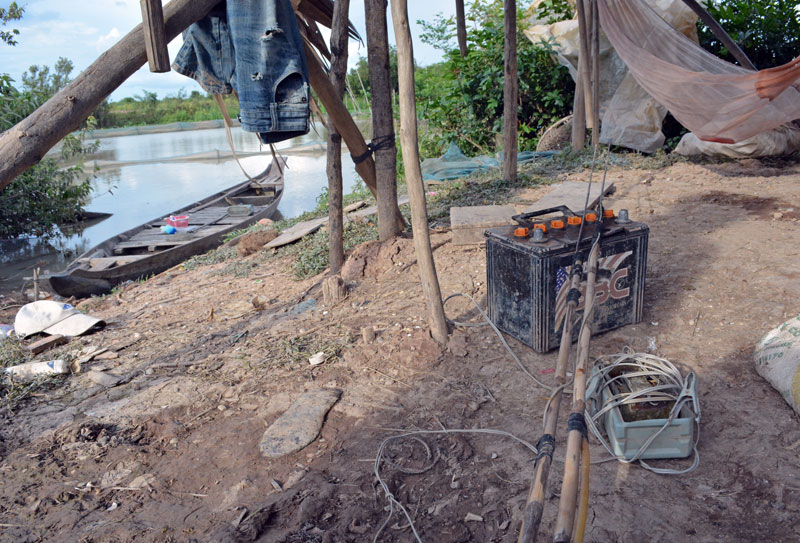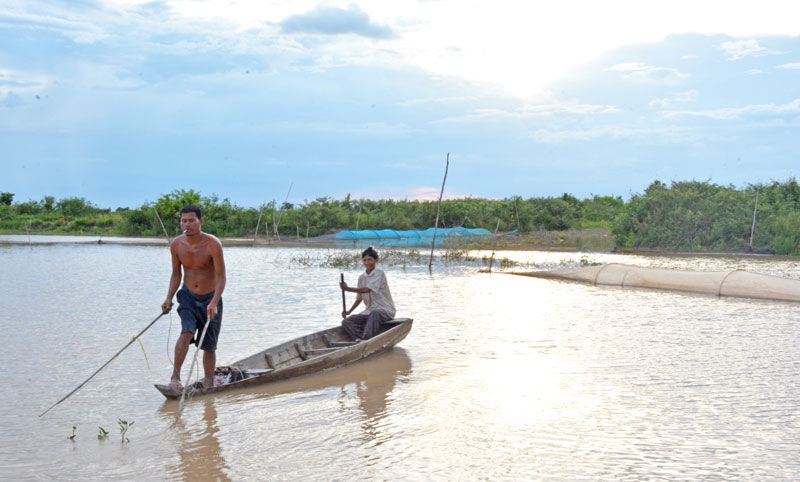BE PRAMMUOY LAKE, Kompong Cham province – Khan Thea, a subsistence fisherman who lives and works along this sprawling, 7,000-hectare lake fed by the Mekong River, was not having a good day on the water.
Struggling to net even a single fish, he finally resorted to a dangerous—and illegal—technique: fishing with electric current.
He and his wife, Chab Chroeb, say they don’t want to fish illegally, but they are too poor not to, especially now that the fish stocks in Be Prammuoy Lake have been seriously depleted by large-scale illegal fishing in the Mekong.

With help from Ms. Chroeb, Mr. Thea, 40, loaded a car battery and a small transformer onto his cracked boat, wired the battery and transformer to two metal rods taped to bamboo sticks, and dipped the electrified rods into the water, hoping to collect the stunned fish as they floated to the surface. But even after he had discharged an electric current into the lake for several seconds, sending up a froth of bubbles, no fish emerged.
“Before if you went in the water you would step on fish,” said Ms. Chroeb, 37, docking her canoe and resigning herself to cooking a meager dinner of foraged mushrooms that night, rather than the fish she had been hoping would feed her family of seven.
“Now they are all gone.”
Prime Minister Hun Sen abolished Cambodia’s system of commercial fishing lots in 2012, a major policy change intended to conserve fish stocks and give local subsistence fishermen a better shot at making a living.
But more than two years after the cancellation of the lots, which covered some 270,000 hectares of fish-rich areas, local villagers and fisheries experts say that little has improved for the fishermen who ply their nets here.
Meas Nee, former chairman of the Fisheries Action Coalition Team (FACT), an NGO that advocates against illegal fishing, said the abolition of private lots was a necessary step, but the handover of the lots to community fisheries groups was not well planned. Now, there are even more illegal fishermen depleting fish stocks than there were before, according to Mr. Nee.
“It just opened the door wide open,” said Mr. Nee, who stepped down from FACT six months ago. “It caused illegal fishing to become widespread. There were no checks in place by authorities.”
Om Savath, executive director of FACT, said illegal fishing in the Mekong River affects fish stocks at inland lakes like Be Prammuoy because large-scale fishermen capture fish that would ordinarily swim there to breed during the rainy season.
“They use very large, fine nets that are illegal,” he said. “All the fish get caught. It seriously affects the migration of fish.”
Eang Naim leads the community fishery in charge of monitoring the six communes that can access Be Prammuoy Lake. He says illegal fishermen on the Mekong, some of whom have been organized by businessmen into loose consortiums, are destroying fish stocks before they have a chance to migrate to the lake.
This forces impoverished villagers to resort to illegal methods themselves —fishing with electricity or stretching long nets across the mouth of the lake.
“It’s the government’s fault for not taking serious enforcement to stop illegal fishing,” he said, alleging that collusion between authorities and the fishermen allows illegal fishing to go unchecked. “The lake has almost nothing now.”
Mr. Naim said he informs authorities at least twice a month about the illegal nets and electric gear—which can lead to infertility in uncaught fish—and the need for better enforcement on Be Prammuoy Lake and the Mekong River.
“We come and spot illegal fishing and keep telling the authorities to come, but they never come,” he said.
According to figures from the Ministry of Agriculture, Forestry and Fisheries, authorities investigated 3,802 cases of illegal fishing across Cambodia in 2013, a drop of nearly 30 percent from 2012. Of those cases, just 96 made it to court.
FACT, on the other hand, found more than 850 cases in which illegal fishing gear was being used in the Mekong and Tonle Sap rivers, and coastal waters, in just four days during a research mission from June 11 to 15.
At the Kompong Cham Cantonment Fisheries Administration, chief of administration In Mong Thana said his officers are simply stretched too thin.
“It is hard. We lack forces,” said Mr. Mong Thana. “That is why we cooperate with officers and the people. The community is our eyes and nose.”
Mr. Mong Thana, who conceded officials have taken bribes in the past but insisted the practice no longer occurs, said there are just 16 enforcement officers to monitor all of Kompong Cham and Tbong Khmum provinces.

Usually, enforcement officers or commune police simply confiscate illegal gear. The fishermen quickly replace it and continue their work.
Hundreds of illegal fishing nets now line Be Prammuoy Lake, as fishermen grow ever more desperate to catch their shrinking share of the fish reaching the lake.
Huong Chan, 44, who has been fishing on the lake for five years, said if authorities stopped others from using illegal nets then she would stop, too.
“It’s hard if I don’t use illegal fishing gear, since other people do it.”
Nao Thuok, director of the Agriculture Ministry’s Fisheries Administration, said the government is “gradually” eliminating illegal fishing.
“We can’t get rid of illegal fishing totally,” Mr. Thuok said. “I acknowledge the crime is still taking place, but we have cracked down a lot, and we need more time and money.”
Ms. Chroeb, the subsistence fisherwoman, said most fishers simply toss their illegal equipment into the bush and run away when they hear the engines of approaching authorities.
“Sometimes when they come and find me, they feel empathy,” she said. “They see that I’m poor and have many kids so they leave me alone.”
The practice of electro-fishing doesn’t only harm fish stocks, it is also risky for fishermen. The Kompong Cham fisheries office confirmed that at least two villagers had died since 2012 from illegal fishing.
A few hundred meters down the lake from Ms. Chroeb and Mr. Thea, Thy Bory, 32, said she knows the dangers of electro-fishing and realizes it is illegal, but continues to do it to feed her children.
“We do it early in the morning because people are sleeping and no one can see us,” she said.
“If I electrocute myself, then I die. I risk my life because I have no choice.”




